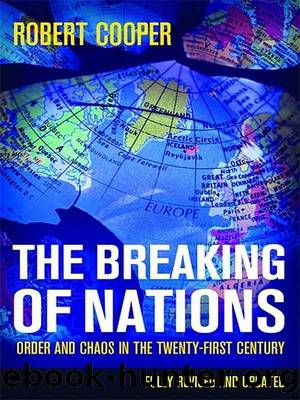The Breaking of Nations by Robert Cooper

Author:Robert Cooper
Language: eng
Format: epub
Publisher: Atlantic Books Ltd
Published: 2011-08-14T16:00:00+00:00
Maxim 2
In the end, what matters is domestic politics
In the nineteenth-century, German historians evolved a theory called the primacy of foreign policy. According to this, the state would always give foreign policy interests precedence over domestic considerations. Since the origin of the state is in the creation of a common security for its people and since the first duty of every state is to protect itself from outside attack, this idea has a certain logic to it. For much of history it has probably held true. As long as states were concerned primarily with defence, and as long as monarchs owed their position to dynastic connections and the sanction of the Church rather than to their people, relations with fellow monarchs were a matter of prime importance. For a long time, in any case, state policy was mainly about foreign and defence questions, with domestic policy coming into focus only because of the need to raise taxes to pay for foreign wars. In the nineteenth century, however, in fact just as the theories about it were being developed, foreign policy was losing its primacy (illustrating Hegel’s point about the owl of Minerva).25 Governments became more dependent on domestic support and domestic supporters – in due course, voters – were increasingly interested in domestic policy.
Today the primacy of the domestic sphere is evident in almost all countries. What keeps governments in power is politics at home, not foreign relations. In Britain no general election in the twentieth century has been won or lost on foreign policy questions and, with one or two exceptions (of which Germany in 2002 might be one), this is true of every democratic country. For undemocratic countries too, the first ambition, often the only ambition, of a government is to remain in power. Sometimes this will involve policies designed to keep the mass of the people happy; sometimes the government’s attention will be focused on keeping the army happy. Whatever happens, keeping foreigners happy is always low on the agenda.
It is easy to multiply examples. The power of industrial lobbies, of campaign contributors – many countries outlaw foreign contributions precisely because of that power – and of farming and fishing lobbies is well documented. Who gets more assistance, a few comparatively well-off farmers at home or the great number of poor people in less-developed countries? The answer, of course, is the farmers: globally, agricultural subsidies are worth about ten times the value of development aid. When it is a choice between domestic and foreign interests, domestic wins. Presidents and prime ministers often listen carefully to messages from foreign leaders, but they always listen much more carefully to messages from domestic interests and from voters. A good diplomat knows how to mobilize domestic lobbies. One ambassador in London, keen to get a senior British minister to pay an official visit to his country and making little progress by the normal methods, told every British company with important business in the offing that they could lose it if the visit didn’t take place.
Download
This site does not store any files on its server. We only index and link to content provided by other sites. Please contact the content providers to delete copyright contents if any and email us, we'll remove relevant links or contents immediately.
International Integration of the Brazilian Economy by Elias C. Grivoyannis(57397)
The Radium Girls by Kate Moore(10921)
Turbulence by E. J. Noyes(7059)
Nudge - Improving Decisions about Health, Wealth, and Happiness by Thaler Sunstein(6644)
The Black Swan by Nassim Nicholas Taleb(6205)
Pioneering Portfolio Management by David F. Swensen(5616)
Rich Dad Poor Dad by Robert T. Kiyosaki(5167)
Zero to One by Peter Thiel(4837)
Man-made Catastrophes and Risk Information Concealment by Dmitry Chernov & Didier Sornette(4750)
Secrecy World by Jake Bernstein(3791)
Millionaire: The Philanderer, Gambler, and Duelist Who Invented Modern Finance by Janet Gleeson(3576)
Skin in the Game by Nassim Nicholas Taleb(3481)
The Age of Surveillance Capitalism by Shoshana Zuboff(3432)
The Money Culture by Michael Lewis(3293)
Skin in the Game: Hidden Asymmetries in Daily Life by Nassim Nicholas Taleb(3273)
Bullshit Jobs by David Graeber(3190)
The Dhandho Investor by Mohnish Pabrai(3176)
The Wisdom of Finance by Mihir Desai(3087)
Blockchain Basics by Daniel Drescher(2896)
